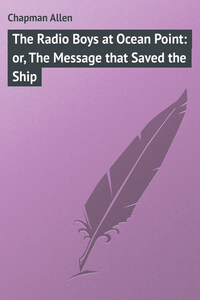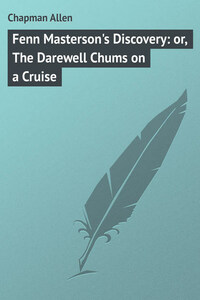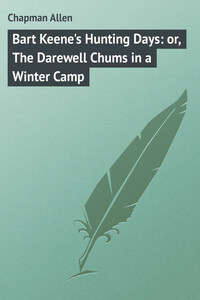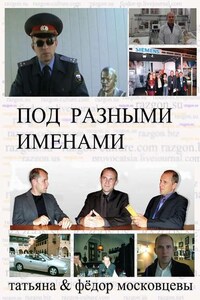FOREWORD
By Jack Binns
In these days of Radio broadcasting, when the country has gone wild over wireless music and entertainment, there is a tendency to overlook the other phases of radio – such as its use as a means of saving life at sea, and for navigational purposes generally. There is no doubt about the interesting character of broadcasting, and equally, there is no doubt about the importance of radio as a means of life saving.
With this thought in mind, I think that the present volume, detailing the adventures of the Radio Boys, serves a very useful purpose in that it forcibly portrays the use of wireless to bring aid to a disabled ship on the high seas in a storm.
By doing this it will inculcate a desire among boys to learn the wireless code and transmit wireless telegraphy messages themselves, and in doing so will tend to develop that nucleus of communication experts in the coming generation, which is always an imperative necessity to every nation.
CHAPTER I – TAKEN UNAWARES
“Jiminy, but this is hot work!” exclaimed Bob Layton, as he laid down the hammer he was using and wiped his perspiring forehead.
“Hot is right,” agreed his friend, Joe Atwood, as he also took a moment’s breathing space. “You might almost think it was August instead of early June. Old Sol must have got mixed up in his calendar.”
“I’d call it a day and knock off right now if we were doing anything else,” remarked Bob. “But, somehow, when I get going on this radio business I can’t seem to quit. There’s something about this wireless that grips a fellow. Work seems like play.”
“Same here,” said Joe. “I guess we’re thirty-third degree radio fans all right. I find myself talking radio, thinking radio, dreaming radio. If there was any such thing as radio breakfast food I’d be eating it.”
“I’m afraid we’ll get thin if we wait for that,” laughed Bob, picking up his hammer and resuming work on the aerial that they were stringing on the top of his father’s barn. “But come along now, old scout, and get a hustle on. We’re going to finish this job to-day if it takes a leg.”
Joe stretched himself lazily.
“I hope it won’t come to that,” he replied. “I need both legs in my business.”
“Well, come along and shake a leg anyway,” counseled Bob. “I’m not asking you to lose one.”
“I’m glad we decided to make this aerial in umbrella shape,” remarked Joe, as, following his friend’s example, he set busily to work. “I think it has it all over the vertical one. We’ll be able to hear the messages from the broadcasting station a heap better than we ever did before.”
“I’m sure we shall,” returned Bob. “That’s the kind Doctor Dale is using on his set, and he tried both the vertical and the flat-top kind before he finally settled on this. It’s better for long-wave work. It stands to reason that since it has the greatest surface area it also has the greatest capacity. Then, too, the end of the antenna that has the greatest potential is nearest the ground. The doctor gave me a lot of dope about it that sounded reasonable. He knows by actual experience, and that’s better than all the theory in the world.”
“What Doctor Dale says goes with me all right,” replied Joe. “He’s never been wrong yet in any of the tips he’s given us. It’s funny, isn’t it,” he continued, as he deftly drove a nail, “that we’re never satisfied with what we’ve got in this radio work? That first set we put together looked pretty good to us at the time. Then the ones with which we won the Ferberton prizes looked a good deal better yet. But now here we are making it still better.”
“That’s the beauty of radio,” said Bob, with enthusiasm. “The surface of it hasn’t been more than scratched so far. It’s practically a brand new thing with a million features to be explored and countless improvements to be made. I suppose a few years from now we’ll be laughing at the instruments we’re using now. They’ll seem as old fashioned as the stage coach and the kerosene lamp. Some of the best brains in the world are working at it now, and there’s hardly a day that you don’t hear of something new in connection with it. It keeps you guessing all the time as to what will turn up next.”
“Right you are,” agreed Joe. “Did you read the other day about that man in Paris who runs his house by radio? You know they have a powerful radio outfit on the Eiffel Tower. That starts operations at six o’clock every morning. This fellow has rigged up things all over his house that are controlled by the waves that come from the tower. First the shutters fly open, then the curtains are drawn back, then electric heaters get into action and begin to make the coffee – ”
“Say,” interrupted Bob, turning to look at his friend, “what are you giving me? Trying to get me on a string?”
“Honest to goodness, I’m not trying to kid you,” replied Joe. “This is straight goods. The coffee begins to bubble in the percolator, the breakfast is started cooking, and the people are waked up by electric bells placed alongside their beds. If the weather is hot, the electric fans are started working.”














